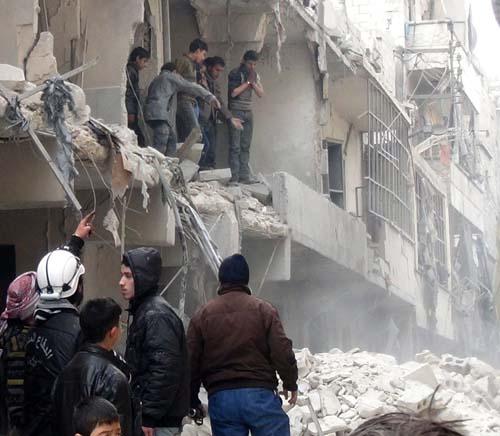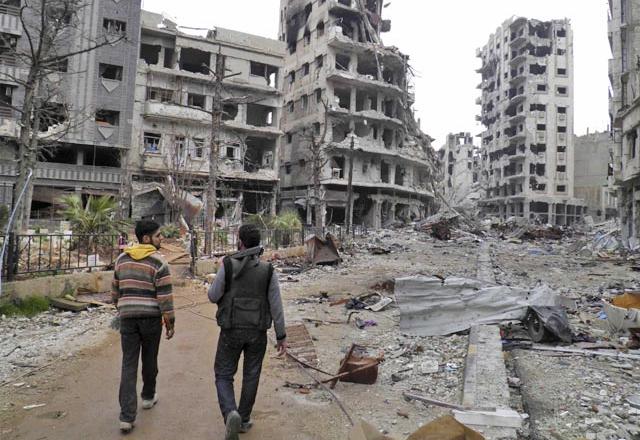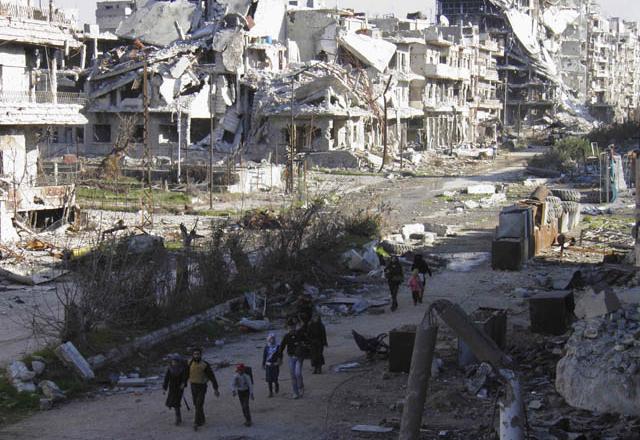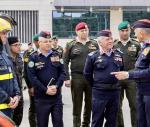GENEVA — Syria’s civil war foes held their first face-to-face meeting on Saturday, launching talks aimed at ending nearly three years of conflict which has killed 130,000 people and destabilised the wider Middle East.
Government and opposition delegates faced each other across a negotiating table at the United Nations headquarters for a total of three hours in the presence of mediator Lakhdar Brahimi, who described the meetings as “a good beginning”.
While political differences which Brahimi says must form the core of their talks appear insurmountable for now, the two sides focused on Saturday on a possible humanitarian deal aimed at building confidence in the negotiating process.
Brahimi said he hoped that authorities in Syria would approve access on Sunday for an aid convoy to reach the rebel-held centre of Homs — allowing it to be delivered on Monday.
“We haven’t achieved much, but we are continuing,” he told a news conference after the talk concluded for the day.
Anxious to avoid any possible confrontations, organisers ensured the two parties entered and left the negotiation room for the morning and afternoon sessions through separate doors.
Brahimi said they faced each other during the meeting but addressed their remarks through him. “This is what happens in civilised discussions, you talk to the president or the speaker or the chairman,” he said.
The veteran international mediator also said he set out his plans for the talks over the coming weeks, stressing that they must ultimately be focused on implementing a June 2012 declaration which called for a transitional governing body to be set up with the consent of Syria’s opposing forces.
“He told us this is a political conference... based on Geneva I,” opposition delegate Anas Al Abdah said, referring to the 2012 communique announced by world powers in the same Swiss city where Saturday’s talks took place.
President Bashar Assad’s government delegation said it broadly accepted Geneva I, but reiterated its longstanding opposition to idea of a transitional body, saying it was inappropriate and unnecessary.
“We have complete reservations regarding it,” Information Minister Omran Zoabi said, comparing the proposal to the transitional government set up in Iraq by US occupation forces after they toppled Saddam Hussein in 2003.
“Syria is a state with institutions,” he added. “A transitional governing body... happens where the state is in disintegration, or has no institutions.”
The opposition has insisted that the government delegation accept the principle of setting up the transitional body, saying it must bring an end to Assad’s rule. The president says only Syrian voters can choose their ruler and that he may well stand again in an election due to be held by June this year.
Barrel bombs
While the two sides met in Geneva, clashes continued across Syria. The Syrian Observatory for Human Rights reported fighting between rebels and Assad’s forces in south Damascus and a series of army air raids across the country, particularly in northern Aleppo and the suburbs outside of Damascus.
Helicopters launched three series of barrel bomb attacks on the suburb of Daraya, the Britain-based monitoring group said, and internecine rebel clashes also continued in the provinces of Hassakeh and Aleppo.
Humanitarian access for central Homs, where insurgents are surrounded by Assad’s forces, could be agreed quickly.
Opposition delegate Abdah said the opposition had already asked fighters on the ground to respect a ceasefire and to protect convoys of aid. Brahimi said the issue was now in the hands of local authorities.
“It was discussed yesterday by the United Nations and the governor [of Homs],” he said. “The idea is that if it is allowed tomorrow, maybe it will go in on Monday.”
Opposition spokesman Louay Safi described Homs a barometer of the government’s good intentions. “If the regime doesn’t want to bring aid into an area where people are starving then we have a problem,” he said. “They are building wells and eating grass and leaves to survive.”
But profound mutual mistrust and the absence from Geneva of powerful Islamist opposition groups as well as Assad’s ally Iran make any substantial progress very difficult, and previous aid deals and ceasefires in Syria have proved short-lived.
The crisis flared with street protests against Assad’s rule in March 2011 and descended into an armed insurgency and civil war after security forces put down demonstrations with force.
There are now hundreds of rebel brigades across the country, including hardline Islamists and Al Qaeda-linked militants. Few pay heed to the opposition in exile and the powerful Islamic Front has said negotiators who return from Geneva without having assured Assad’s downfall will be treated as traitors.
Diplomats say Brahimi is trying to secure progress on humanitarian aid, local ceasefires and prisoner releases to build up support inside Syria for the talks process, before embarking on the tougher political negotiations.
“I think an immediate political solution is unrealistic, unfortunately,” French Foreign Minister Laurent Fabius told France 24 television.
Syria’s civil war has made half of the 22 million population dependent on aid, including hundreds of thousands cut off by fighting.

















